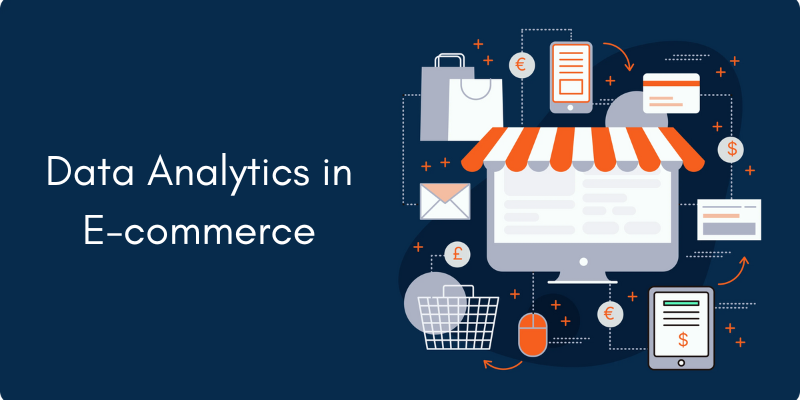In today's competitive e-commerce landscape, businesses are constantly seeking innovative ways to improve sales and customer engagement. Data analytics is one of the most effective tools for achieving these objectives. By analyzing customer behavior, purchase patterns, and operational data, e-commerce businesses can uncover actionable insights that drive growth. Businesses can utilize data analytics to enhance performance, personalize experiences, and make informed decisions. Leveraging AI in Data Analytics allows e-commerce platforms to process massive datasets quickly, revealing trends and opportunities that enhance strategic decision-making.
The Role of Data Analytics in E-commerce
Understanding consumer preferences and forecasting trends are made possible in large part by data analytics. Every click, search query, and purchase leaves a digital footprint that can be analyzed for valuable insights. Businesses use this data to track popular products, evaluate the performance of marketing campaigns, and forecast demand. By leveraging analytics, e-commerce companies can adjust their strategies proactively, avoiding stockouts or overstocking.
For instance, online retailers like Amazon and Flipkart use advanced analytics to personalize recommendations, which not only enhances the shopping experience but also increases sales conversions. This level of customization builds customer loyalty and drives repeat purchases.
Personalization and Customer Segmentation
Personalized experiences are one of the most powerful outcomes of e-commerce analytics. By segmenting customers based on demographics, browsing habits, and purchase history, businesses can tailor marketing messages and product recommendations.
For instance, a consumer who regularly purchases exercise gear would get tailored offers on similar products, such as protein supplements or sportswear. This type of personalization enhances customer satisfaction and increases conversion rates. Data analytics also helps in identifying high-value customer segments, enabling businesses to allocate their marketing budgets more efficiently. As technology evolves, Integrating Machine Learning with Data Analytics helps refine these segments further, predicting customer needs with even greater accuracy.
Optimizing Pricing Strategies
Dynamic pricing is another area where data analytics shines. By analyzing competitor prices, demand fluctuations, and historical sales data, businesses can set optimal prices for their products. This approach ensures competitiveness while maximizing profit margins.
E-commerce platforms can use machine learning models to predict how changes in pricing will affect demand. For example, during festive sales or clearance events, analytics can help determine which discounts will attract more customers without significantly reducing profits. Strategic pricing decisions driven by data can lead to substantial revenue growth.
Enhancing Inventory and Supply Chain Management
Managing inventory efficiently is essential for maintaining customer satisfaction and minimizing costs. Through precise demand forecasting made possible by data analytics, companies may minimize surplus inventory while maintaining stock levels of popular commodities.
Supply chain operations can also benefit from analytics by identifying bottlenecks, predicting delays, and optimizing shipping routes. For instance, e-commerce giants use real-time analytics to reroute shipments or adjust delivery schedules, ensuring that customers receive their orders on time. Streamlined inventory and logistics directly contribute to increased sales and customer retention.
Improving Marketing Campaigns
Marketing campaigns are a significant investment for e-commerce businesses, and data analytics ensures these campaigns deliver maximum ROI. Businesses may determine what works and what doesn't by examining campaign success indicators like click-through rates, conversion rates, and customer engagement.
For example, if an email marketing campaign has a low open rate, analytics can reveal whether the subject line, timing, or audience targeting needs adjustment. Social media platforms also provide detailed analytics that help businesses refine their content strategies to attract and retain customers effectively. Professionals looking to master these skills can enroll in a Data Analytics Course in Chennai to gain practical expertise and hands-on experience in leveraging analytics for impactful marketing strategies.
Fraud Detection and Risk Management
E-commerce businesses face risks such as payment fraud and identity theft. Unusual transaction patterns, including repeated purchases made from the same IP address or abrupt shifts in purchasing habits, can be found using data analytics techniques. By flagging these anomalies early, companies can prevent fraud and protect their revenue.
Advanced analytics systems can also assess credit risk and ensure compliance with regulations. Implementing robust fraud detection measures not only saves businesses money but also builds trust with customers who feel their transactions are secure.
Enhancing the Customer Journey
Understanding and improving the customer journey is another way analytics boosts e-commerce sales. Businesses can map out every touchpoint—from initial website visits to post-purchase feedback and identify areas for improvement.
For instance, if analytics show that many users abandon their carts at the payment stage, businesses can investigate potential issues like complicated checkout processes or hidden fees. Making data-driven improvements enhances user experience, which directly impacts conversion rates and customer loyalty. To build expertise in these strategies, aspiring professionals can learn advanced techniques from the Best Training Institute in Chennai , ensuring they stay competitive in the evolving e-commerce landscape.
Data analytics has revolutionized the e-commerce industry by transforming raw data into actionable insights. From personalizing customer experiences and optimizing pricing strategies to improving supply chain management and detecting fraud, analytics empowers businesses to make smarter decisions. Businesses may increase income, improve customer happiness, and keep a competitive advantage in the online market by investing in strong analytics tools and methods. By leveraging expert knowledge gained from specialized training, businesses can thrive in an ever-changing, customer-centric world.



